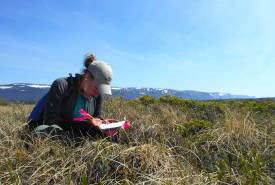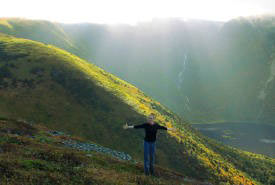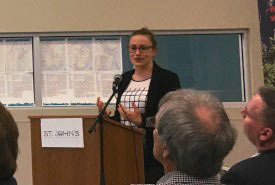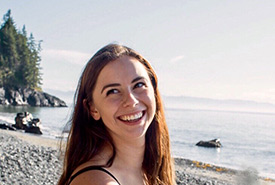Where are they now? Intern Alumni Spotlight: Megan Lafferty

Megan Lafferty (Photo by Brian Yungblut)
This blog is the first in a series of stories highlighting some of the individuals who have interned with the Nature Conservancy of Canada (NCC).
Follow along as I interview NCC’s Conservation Intern alumni from across the country, and learn more about the paths they have taken to get to where they are today, and how their internships contributed to their personal conservation journeys.
Megan Lafferty
Where she started: After high school, Megan completed a bachelor’s degree in forensic science, but later realized her passion lay in conservation. With a desire for change, Megan upped and moved from Ontario to Newfoundland and Labrador, where she pursued a master’s of environmental science at Memorial University.

Megan Lafferty conducting field work during her 2013 internship. (Photo by NCC)
As an intern: Megan interned with NCC in 2013 as a Conservation Intern in Newfoundland and Labrador, where she implemented property management plan actions during the summer field season. This included conducting property monitoring, completing baseline inventories and leading Conservation Volunteers events.
Where she is now: After finishing her internship, Megan continued to work with NCC in Atlantic Canada, first as a stewardship coordinator, then as a conservation biologist. After five years, Megan is now the acting program director for Newfoundland and Labrador. She is responsible for leading the conservation program in the province through planning and carrying out NCC land conservation activities. These activities include:
- coordinating land purchases and donations;
- collaborating with partners;
- initiating and participating in various conservation projects across the province; and
- supporting fundraising and communications efforts.
Where she is going: Megan would like to continue to grow within the conservation sector. She enjoys a balance between working behind the scenes as well as being out and on the ground in nature.
Interview
Brielle (BR): How did your internship with NCC contribute to your professional journey?

Megan Lafferty enjoying the views of Newfoundland and Labrador (Photo by NCC)
Megan Lafferty (ML): My internship with NCC allowed me to apply what I learned in school and put my knowledge into context. I think that you can learn theory and concepts, but it’s not until you see them put into practice that you start to get an understanding of how they really work on the ground. The biggest eye-opener following the conclusion of my internship was how much conservation is about people. It’s about how people connect to the landscape, how people use the land and how people value the natural world.
BR: What skills do you think are the most important for those working in the environmental sector?

Megan Lafferty presenting to NCC partners. (Photo by NCC)
ML: I think communication and the ability to listen to others are really important skills in all sectors, particularly the environmental sector. We all have our own sense of what conservation should be and what protection of natural landscapes should look like. By listening and placing yourself in other people’s shoes, you can accomplish collaboration. This is incredibly important, since we can’t operate individually while hoping to make a big difference.
BR: Did your internship with NCC provide you with the opportunity to develop any of these skills?
ML: My internship definitely gave me the opportunity for skills development. To get my work plan done I needed to have conversations and collaborate with partner groups and other organizations. My internship was about listening and learning how to apply my skills in the real world.
BR: Why do you think it is important for young professionals to be interested/employed in the environmental sector?
ML: The environmental sector is facing some big challenges, but I believe there is still room to make a difference. I think young people will have a key role to play in this. They often bring forward things that people who have been in the field for a longer time may not have thought of, or perhaps thought were not possible. I think new, creative and different thinkers coming into the sector are really valuable.
BR: What advice would you give to your younger self?
ML: I would say don’t undervalue an experience you’ve had. No matter the job or the experience, there are skills you have learned and things you have gained that you can apply to other jobs.
The Conservation Internship Program is funded in part by the Government of Canada’s Summer Work Experience program.


